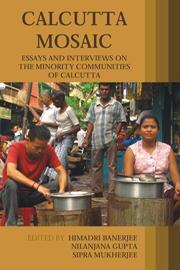Book contents
- Frontmatter
- Contents
- List of Contributors
- Acknowledgements
- Introduction
- 1 Mapping the Spaces of Minorities
- 2 The Armenians of Calcutta
- 3 The Jews of Calcutta: An Interview with Michael Ezra
- 4 The Sindhis of Calcutta
- 5 The City of Colleges
- 6 The Chinese Community of Calcutta
- 7 The Anglo–Indians of Calcutta
- 8 The Biharis of Calcutta
- 9 Agraharis of Calcutta
- 10 A Journey into My Neighbourhood
- 11 The ‘South Indians’ of Calcutta: Experiences in Cultural Processes
- 12 ‘Non-Bengali’ Icons of Malevolence
- 13 Selfing the City
5 - The City of Colleges
The Bengali-Muslim in Colonial Calcutta
Published online by Cambridge University Press: 05 March 2012
- Frontmatter
- Contents
- List of Contributors
- Acknowledgements
- Introduction
- 1 Mapping the Spaces of Minorities
- 2 The Armenians of Calcutta
- 3 The Jews of Calcutta: An Interview with Michael Ezra
- 4 The Sindhis of Calcutta
- 5 The City of Colleges
- 6 The Chinese Community of Calcutta
- 7 The Anglo–Indians of Calcutta
- 8 The Biharis of Calcutta
- 9 Agraharis of Calcutta
- 10 A Journey into My Neighbourhood
- 11 The ‘South Indians’ of Calcutta: Experiences in Cultural Processes
- 12 ‘Non-Bengali’ Icons of Malevolence
- 13 Selfing the City
Summary
A hint of an education and next he'll be suffixing a ‘Khan Sahib’ or prefixing a ‘Syed’ to his name.
Mohammad Yaqub Ali, Jater Barai.Calcutta has, for the past hundred years or more, been looked upon as the city to which thousands have travelled for education and employment. The founding of the Calcutta Madrassa (later Alia Madrassa) in October 1780 and the Calcutta University on 24 January 1857 by Warren Hastings, by the incorporation of an Act of the Legislative Council, established Calcutta as the centre of education in the east. These institutes of higher education attracted students from all over Bengal, Assam, Bihar, Orissa and many other states. Education, in the changed context of the post- Mutiny period, was the route through which many discovered the tools to create a new, and more desirable, identity. It was the key of access to employment, and thence to privileges that had been till then closed to many. With its numerous schools and colleges set up by either the Christian missionaries or the native wealthy landlords and later the government, with its mercantile promise and its colonial institutions of power, ‘no other Indian city dominated its hinterland as completely as Kolkata dominated Bengal’. People from the far-flung rural regions of Bengal journeyed to this distant centre of power, braving the terror of thugs and enduring the lack of proper inns along the way, the extremes of weather, the discomforts of transport.
- Type
- Chapter
- Information
- Calcutta MosaicEssays and Interviews on the Minority Communities of Calcutta, pp. 111 - 130Publisher: Anthem PressPrint publication year: 2009



